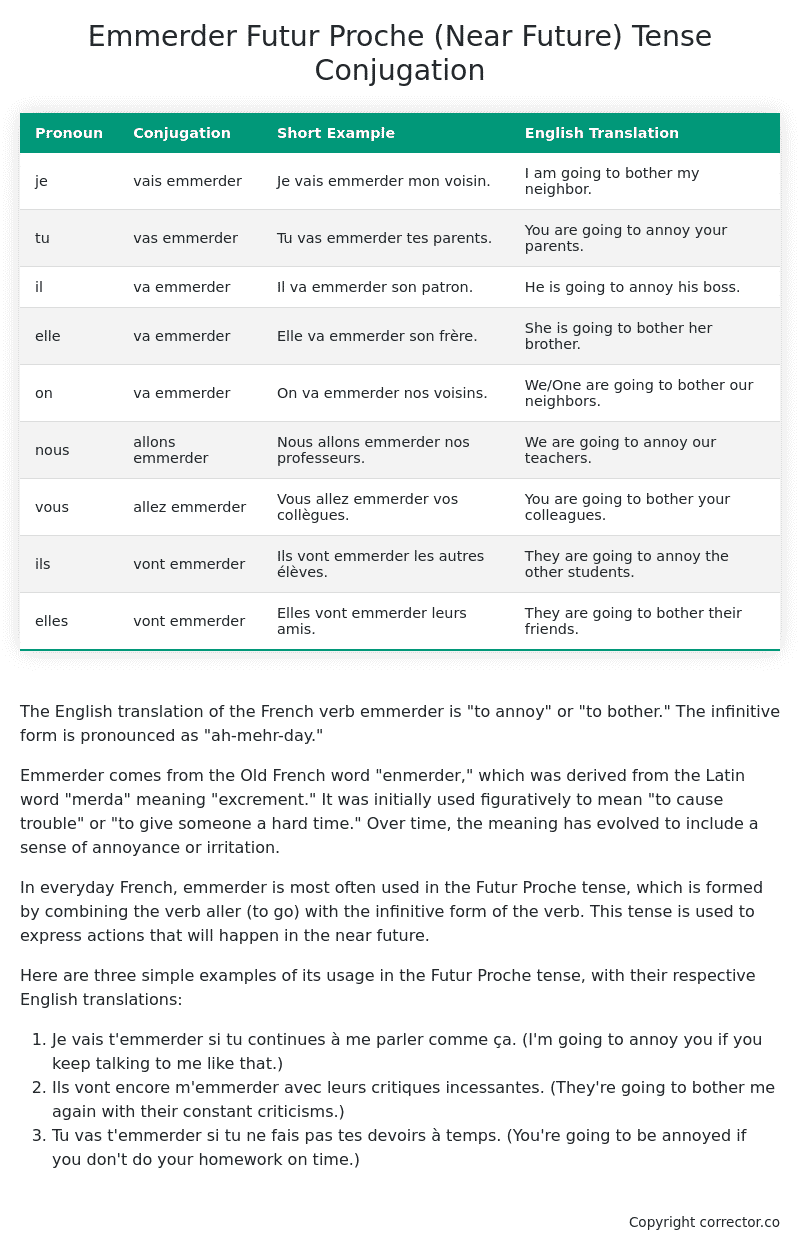Futur Proche (Near Future) Tense Conjugation of the French Verb emmerder
Introduction to the verb emmerder
The English translation of the French verb emmerder is “to annoy” or “to bother.” The infinitive form is pronounced as “ah-mehr-day.”
Emmerder comes from the Old French word “enmerder,” which was derived from the Latin word “merda” meaning “excrement.” It was initially used figuratively to mean “to cause trouble” or “to give someone a hard time.” Over time, the meaning has evolved to include a sense of annoyance or irritation.
In everyday French, emmerder is most often used in the Futur Proche tense, which is formed by combining the verb aller (to go) with the infinitive form of the verb. This tense is used to express actions that will happen in the near future.
Here are three simple examples of its usage in the Futur Proche tense, with their respective English translations:
- Je vais t’emmerder si tu continues à me parler comme ça. (I’m going to annoy you if you keep talking to me like that.)
- Ils vont encore m’emmerder avec leurs critiques incessantes. (They’re going to bother me again with their constant criticisms.)
- Tu vas t’emmerder si tu ne fais pas tes devoirs à temps. (You’re going to be annoyed if you don’t do your homework on time.)
Table of the Futur Proche (Near Future) Tense Conjugation of emmerder
| Pronoun | Conjugation | Short Example | English Translation |
|---|---|---|---|
| je | vais emmerder | Je vais emmerder mon voisin. | I am going to bother my neighbor. |
| tu | vas emmerder | Tu vas emmerder tes parents. | You are going to annoy your parents. |
| il | va emmerder | Il va emmerder son patron. | He is going to annoy his boss. |
| elle | va emmerder | Elle va emmerder son frère. | She is going to bother her brother. |
| on | va emmerder | On va emmerder nos voisins. | We/One are going to bother our neighbors. |
| nous | allons emmerder | Nous allons emmerder nos professeurs. | We are going to annoy our teachers. |
| vous | allez emmerder | Vous allez emmerder vos collègues. | You are going to bother your colleagues. |
| ils | vont emmerder | Ils vont emmerder les autres élèves. | They are going to annoy the other students. |
| elles | vont emmerder | Elles vont emmerder leurs amis. | They are going to bother their friends. |
Other Conjugations for Emmerder.
Le Present (Present Tense) Conjugation of the French Verb emmerder
Imparfait (Imperfect) Tense Conjugation of the French Verb emmerder
Passé Simple (Simple Past) Tense Conjugation of the French Verb emmerder
Passé Composé (Present Perfect) Tense Conjugation of the French Verb emmerder
Futur Simple (Simple Future) Tense Conjugation of the French Verb emmerder
Futur Proche (Near Future) Tense Conjugation of the French Verb emmerder (this article)
Plus-que-parfait (Pluperfect) Tense Conjugation of the French Verb emmerder
Passé Antérieur (Past Anterior) Tense Conjugation of the French Verb emmerder
Futur Antérieur (Future Anterior) Tense Conjugation of the French Verb emmerder
Subjonctif Présent (Subjunctive Present) Tense Conjugation of the French Verb emmerder
Subjonctif Passé (Subjunctive Past) Tense Conjugation of the French Verb emmerder
Subjonctif Imparfait (Subjunctive Imperfect) Tense Conjugation of the French Verb emmerder
Subjonctif Plus-que-parfait (Subjunctive Pluperfect) Tense Conjugation of the French Verb emmerder
Conditionnel Présent (Conditional Present) Tense Conjugation of the French Verb emmerder
Conditionnel Passé (Conditional Past) Tense Conjugation of the French Verb emmerder
L’impératif Présent (Imperative Present) Tense Conjugation of the French Verb emmerder
L’infinitif Présent (Infinitive Present) Tense Conjugation of the French Verb emmerder
Struggling with French verbs or the language in general? Why not use our free French Grammar Checker – no registration required!
Get a FREE Download Study Sheet of this Conjugation 🔥
Simply right click the image below, click “save image” and get your free reference for the emmerder Futur Proche tense conjugation!

Emmerder – About the French Futur Proche (Near Future) Tense
Formation
1. Conjugate “aller” in the present tense according to the subject pronoun:
2. Add the infinitive of the main verb immediately after “aller.” For example:
Common Everyday Usage
Interactions with Other Tenses
Present Tense
Past Tense
Conditional Tense
Summary
I hope you enjoyed this article on the verb emmerder. Still in a learning mood? Check out another TOTALLY random French verb conjugation!


